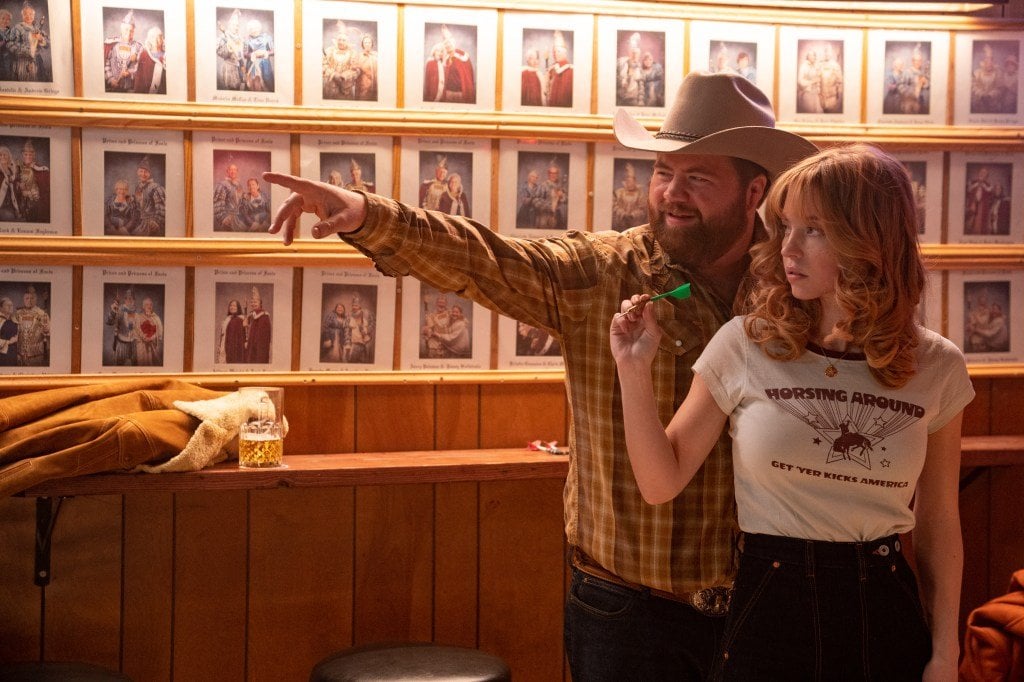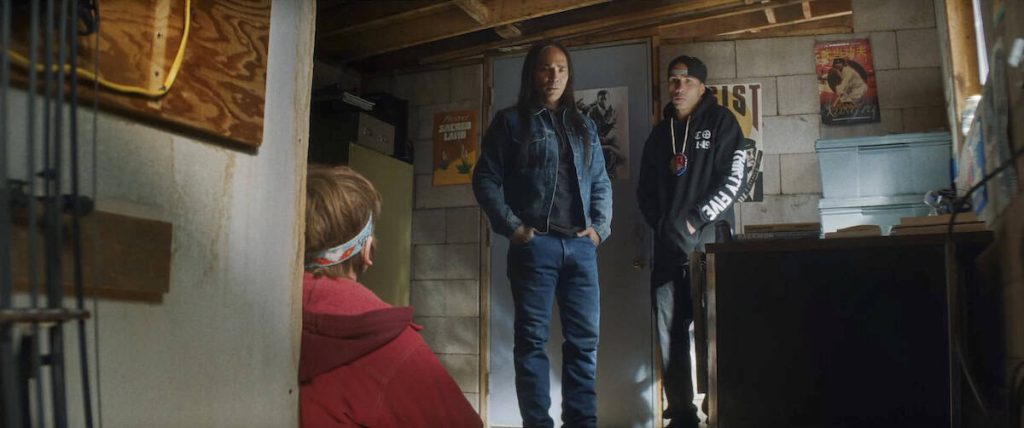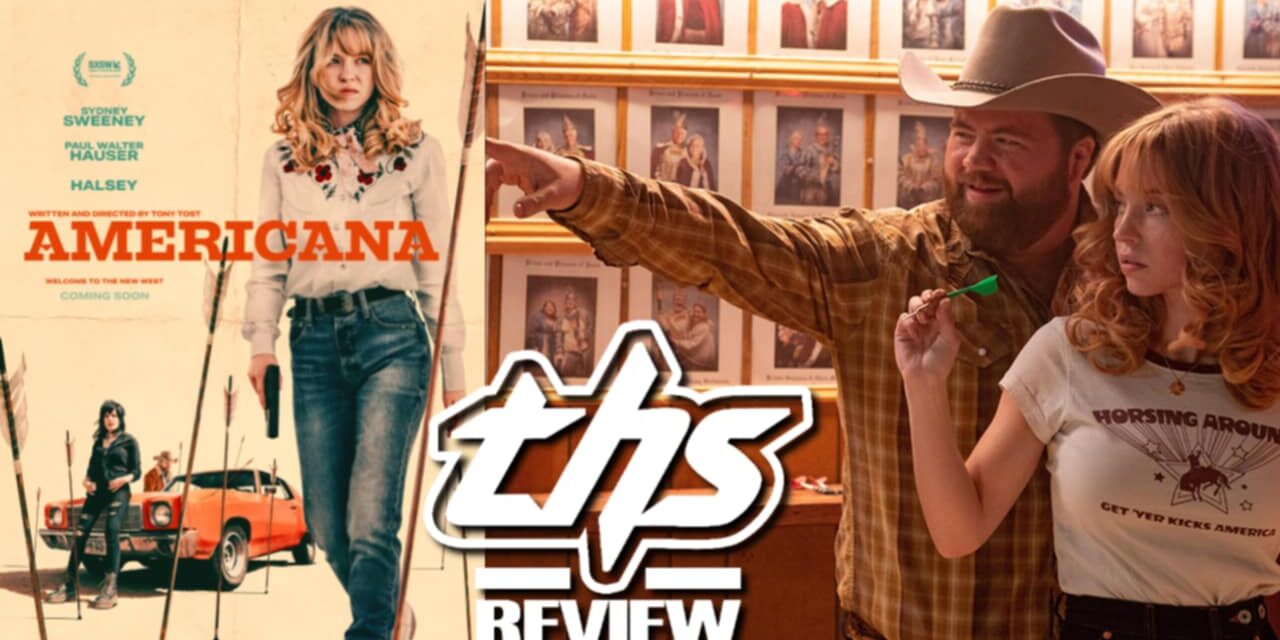The Declaration of Independence straightforwardly notes rights to life, liberty, and the pursuit of happiness. Nothing is guaranteed; everything’s a hustle. It’s an impetus for American creativity and success, but it also fuels predatory behavior, criminal undertakings, and a need to always hustle and strive, never satiated. Tony Tost’s Americana follows a host of characters in need–some to escape their past or present, some to restore their tribal legacy, some for cold, hard cash. It’s a little slow in parts, and it could use a boost of tension or adrenaline at times, but it’s a smart, well-performed outing with a banger of an ending, breathing new life into the Western.
Americana follows a series of intersecting narratives over a succession of chapters, all centering around an effort to steal and sell a Lakota artifact, a rare ghost shirt. Waitress Penny Jo (Sydney Sweeney) is stuck in South Dakota but she has Nashville singer dreams. They come to the fore when she discovers a meeting promising great riches if a pair of neer-do-well criminals, including Dillon (Eric Dane), can deliver said ghost shirt into the hands of shady Native artifact seller Roy Lee (Simon Rex). Penny persuades hopeless romantic “Lefty” Ledbetter (Paul Walter Hauser) to help her acquire the shirt first, in a criminal caper that also comes to involve radical Indigenous liberation activist Ghost Eye (Zach McClarnon) and Dillon’s jilted lover, Mandy (Halsey) in the fray.
‘Americana’ Marks Stellar Performances From Sydney Sweeney, Zach McClarnon
Americana finds considerable complexity in the film’s multiparty struggle to secure the ghost shirt for themselves. Most want money, but several are desperately locked into regrettable cycles that they simply can’t escape. Though they engage in actions of questionable morality, it’s for sympathetic reasons, providing an interesting point of contrast against the claims of Lakota tribal members whose claim to the shirt centers on a rightful recognition of history. It’s a serious web of serious people who have very different degrees of experience with these sorts of conflicts, and writer-director Tony Tost finds considerable drama and conflict in their interrelations.

As a consequence of this episodic, carefully woven structure, Americana rests in large margin on the strength of its ensemble, given the importance of distinct groupings of motivated individuals and frequently changing perspectives. As a consequence, there are a number of standouts. Throughout her growing career, Sydney Sweeney has always been at her best in the more intense roles, whether it’s rage, heartbreak, insanity, or the uncontrollable first moments of love and lust. Her role in Americana as the young and delicate (but ambitious and subtly manipulative) Penny Jo is a big departure from that tradition. She shines, and this may well be the best she’s been in a more muted role. Paul Walter Hauser is playing a variation of a role that he’s performed many times, a good-natured man with a heart slightly bigger than his brain, and it’s a sweet, pointedly sad portrayal.
Halsey is memorable as an iconoclastic girlfriend stuck with a dangerous man and desperate to escape the weight of her past for good. Her finest work in the film comes after she heads back to her hometown to confront the past, getting a bit more than she bargained for. Zach McClarnon brings a certain gravitas as the head of a radical native American faction looking to return what’s been stolen from their tribe once and for all. He brings a seasoned, but unyielding, wisdom to the character that elevates that leg of the complex, weaving arc. There really aren’t weak links, landing the drama and more complicated emotional moments well.
Americana Finds Novel Ways To Modernize The Traditional Western
The biggest issue with Americana is two-fold. On the one hand, even though there’s a constant circling of these different parties around the artifact, and consequently a large sum of money, there are missed opportunities to increase our perception of tension and growing danger. Each time it turns a new chapter, we lose a sense of the characters’ growing desperation and chaotic inner life. While the finale brings many of these plot elements forward at the end, it would be a more satisfying journey with some of that tension maintained and escalated with more regularity. Secondarily, it’s quite slow in parts, boiling slowly and methodically until its bloody finale. That’s fantastic under tension, waiting for the next shoe to drop, but since Americana often loses tension, the slow pace of progression is simply that: slow.

Americana still manages to interweave a complicated tapestry of dangerous strivers, hinging around yet one more attempt to expropriate Native American tribes and commodify tribal history. Sweeney, McClarnon, Halsey, and Hauser all turn in excellent, grounded portrayals, and the finale is an energetic, fist-pumping throwdown that eviscerates the patriarchy… or at least a few manifestations of it. It isn’t perfect, but Tost found a successful route into modern Western territory without leaning on ironic deconstruction or genre hybridization. It rests on traditional Western imagery–even featuring besieged white frontiersmen surrounded by arrow-launching Native warriors–while smartly upending its archaic, traditional moral coding. Americana isn’t perfect, but it’s a smart, often tense riff on the Western that shouldn’t be missed.
Americana his theaters nationwide on August 15.


![Black Butler -Emerald Witch Arc- Ep. 2 “His Butler, Sounding The Alarm”: Witch Of The Castle [Review]](http://18.211.146.234/wp-content/uploads/2025/04/2c22b741-1105-4b36-b807-3130b0dd3330-440x264.jpg)


